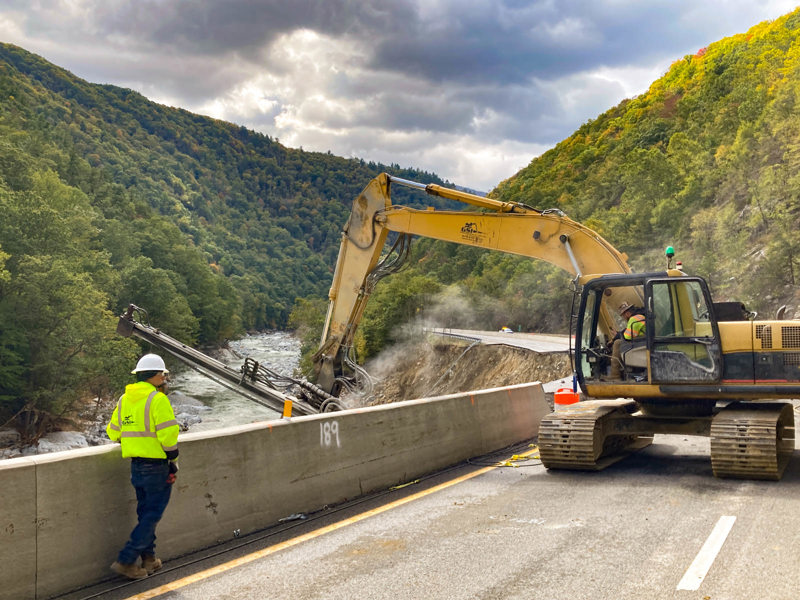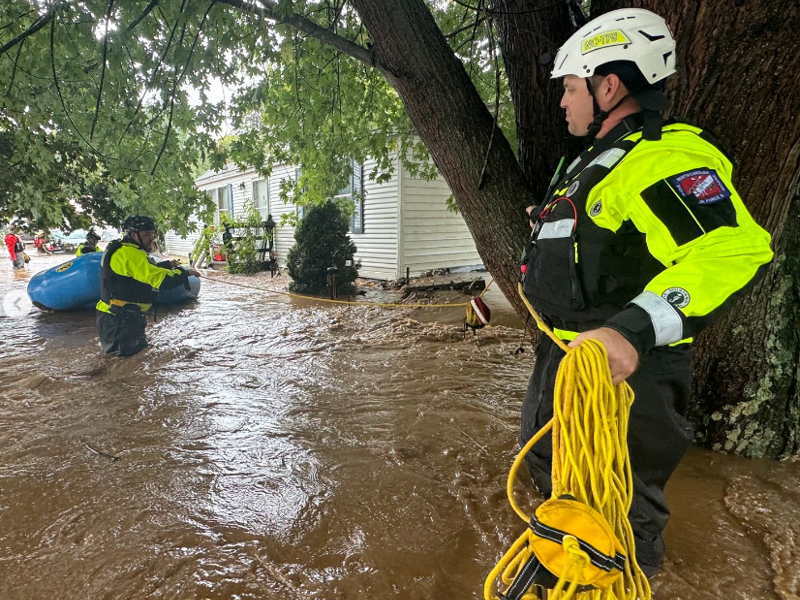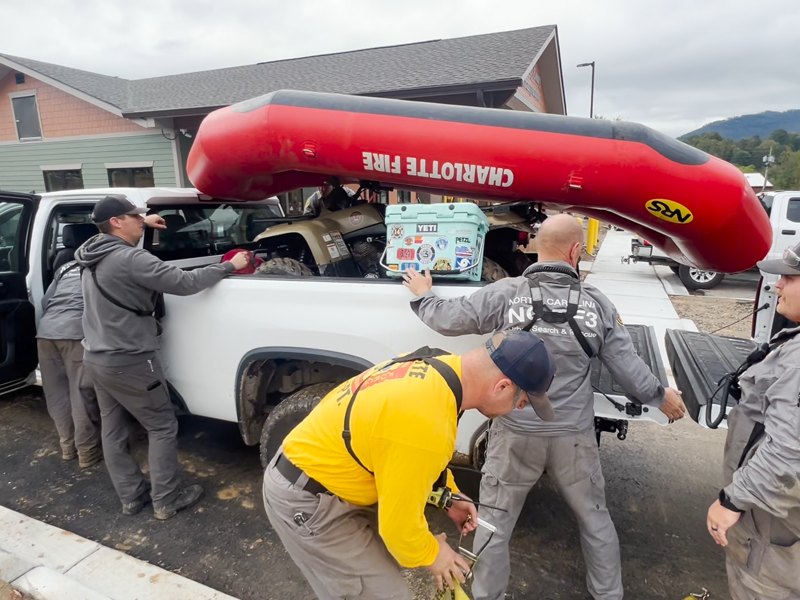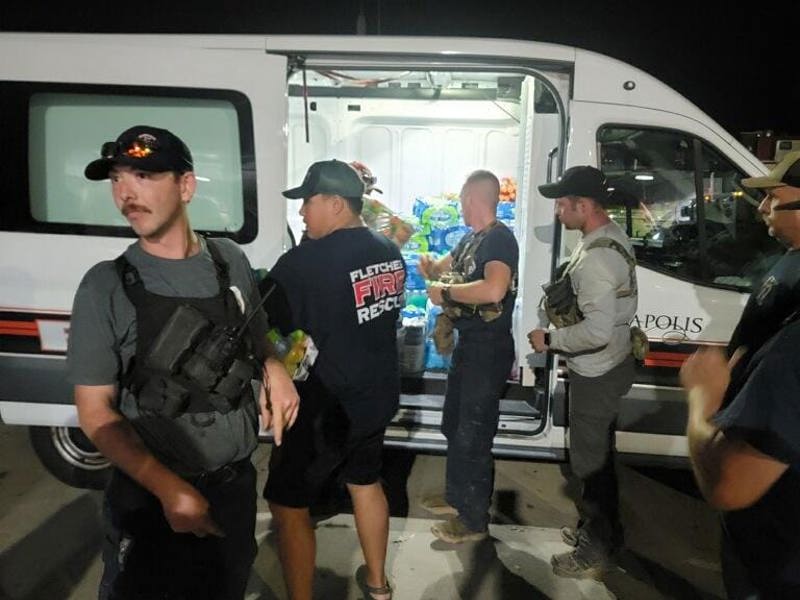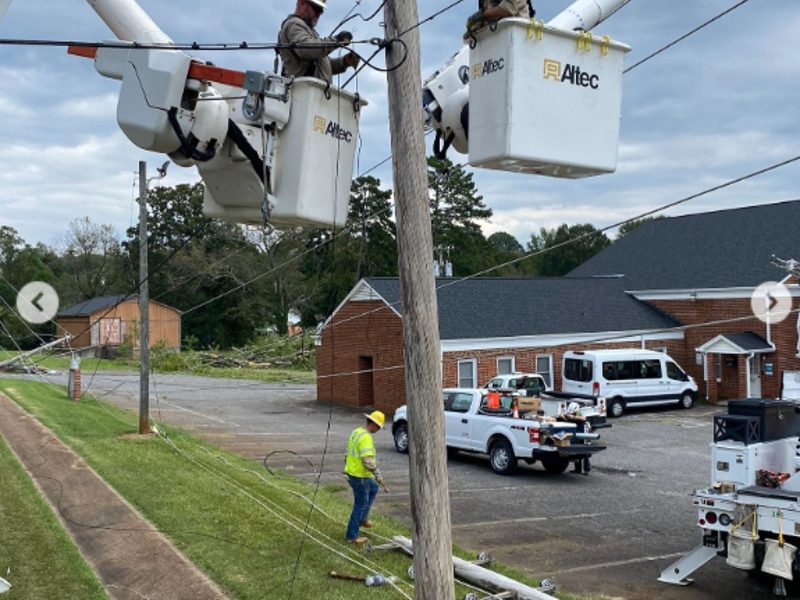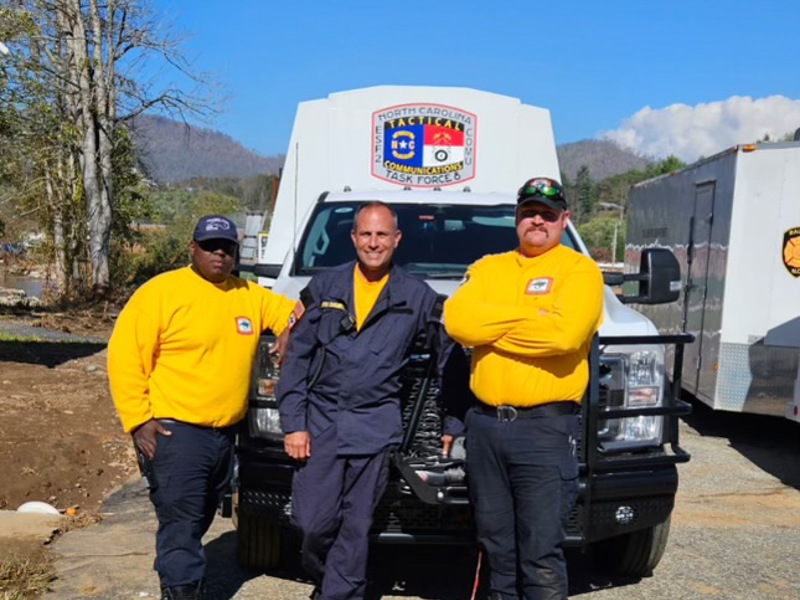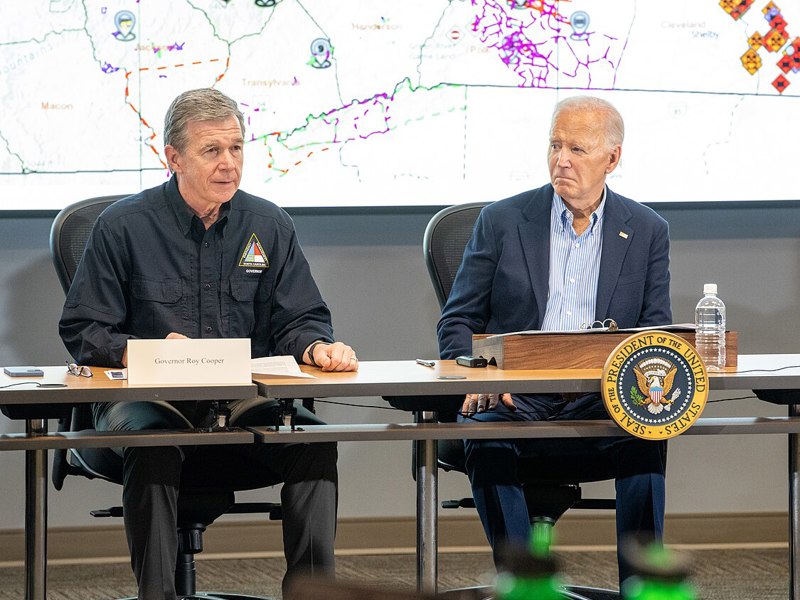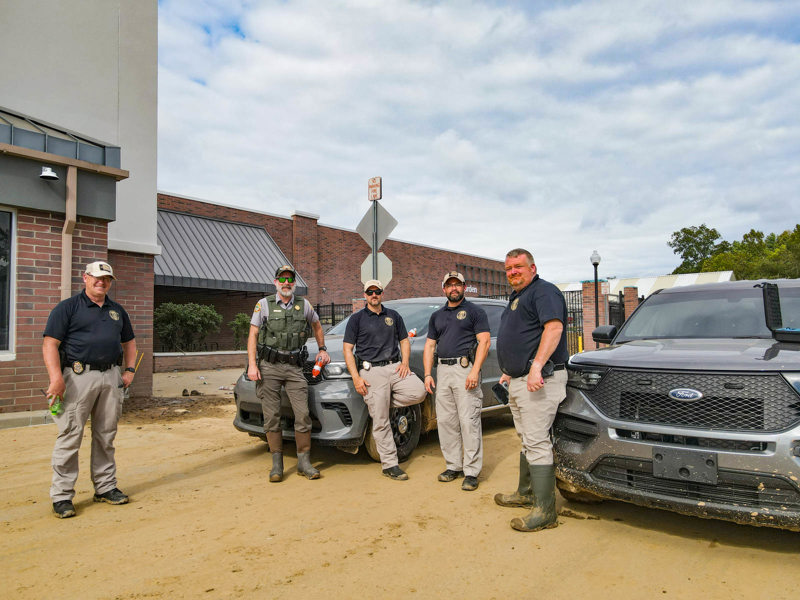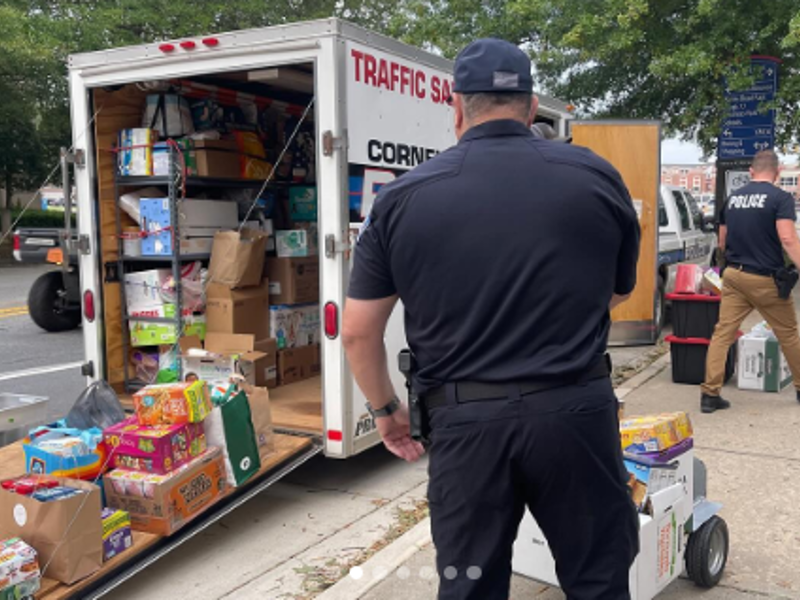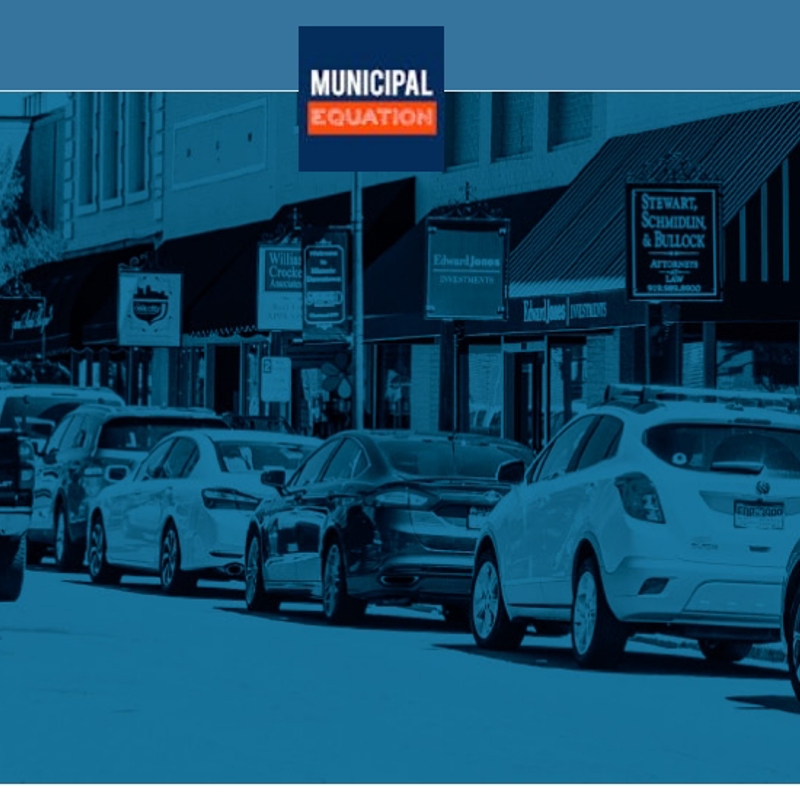Hurricane Helene: The Power of Mutual Aid in Western North Carolina
Q4 2024 | Vol. 74, Issue 4
The Impact of Hurricane Helene
Category 4 Hurricane Helene made landfall up through the Big Bend region of Florida on the evening of Sept. 26, 2024, with maximum wind speeds reaching 140mph. As the storm traveled north through Georgia and into eastern Tennessee and western North Carolina, the storm poured rain forcefully down in the mountainous towns of NC in the early hours of Sept. 27. The unprecedented rains brought flash floods and landslides, wiping out entire downtowns and neighborhoods throughout western NC.
Marion Mayor Steve Little said the storm was almost incomprehensible to witness. He noted a main street in his area that became a river—“a raging, torrential, fast-moving river that was carrying logs and pieces of trees and debris and washing mobile homes off of their attachments and bringing them down the river,” he said. “Cars being washed away. Things that we cannot even comprehend. We see things in movies or even cartoons and you see that happening and it’s not real—but this was real, and it was happening.”
Municipalities big and small lost cellular service for days on end, power for weeks, and some are still repairing water and sewer infrastructure—leaving many residents without clean drinking water.
“I think of those people that so needed desperately to call for help but couldn’t because the cell phone—no communications worked for those folks. It’s heartbreaking,” said Murphy Mayor Tim Radford.
The physical and emotional toll on residents has been immense, but neighboring municipalities’ emergency and on-going response has been a beacon of hope.
A Network of Support: The Mutual Aid System
North Carolina's mutual aid system is a robust framework designed to organize collaboration among municipalities during times of crisis. When Hurricane Helene made landfall, cities and towns across the state sprang into action, sharing resources and personnel to assist in recovery efforts. Firefighters, police officers, emergency medical technicians, and public works teams from various municipalities arrived in western North Carolina to aid in search and rescue operations, debris removal, and restoration of essential services. Not only did these teams provide hands-on assistance, but they also coordinated logistics, shared tools, and ensured that vital communication lines were restored.
Along with many other municipalities, the Town of Chapel Hill’s emergency management team deployed ahead of the hurricane to begin preparing emergency shelter for those affected. As the storm rolled through western NC, Chapel Hill’s fire and police department aided search and rescue efforts in Haywood and Mitchell counites. The parks and recreation department volunteered equipment to the City of Hendersonville to help clean up roads and debris.
Working with the NC Emergency Management Team, the Raleigh Police Department (RPD) was assigned to recovery efforts in the town of Black Mountain. Major Brian Harrison of the RPD said in a Raleigh newsletter that the “most important mission was to bring a sense of peace and safety to a community that was looking for some kind of normalcy.”
RPD officers assisted the town of Black Mountain with security checks and checking in on welfare calls to confirm that community members were safe, and relaying that information back to concerned friends and family members. Additionally, RPD officers assisted at food and water distribution centers and provided delivery of essential items needed for residents who could not leave their homes.
The City of Charlotte experienced flooding as Helene rolled through its communities, but once those waters receded, it became clear to Charlotte Fire’s Swift Water Rescue Team that there was much more work to be done in Yancey County. The team, consisting of 17 highly-trained fire fighters, were deployed via ATVs, helicopters and on foot to the isolated mountain areas where families were stranded by the floods.
"There were moments when it was life or death," Charlotte Fire Captain Jeff Bright recalled in a Charlotte newsletter. "We found families stranded on their roofs, elderly residents trapped in homes surrounded by water, and people who had been completely cut off from the world for days. Our job was to get them out, and we did everything we could to make sure that happened."
These are a just a small few of the mutual aid stories that occurred out west. Other towns such as Apex, Cornelius, Kannapolis, Leland, Cary, and so many more, sent additional police and fire personnel, as well as public works staff to help fix water and cellular infrastructure for citizens.
The mutual aid system in North Carolina is not just about responding to disaster but also about long-term recovery. Support continues after the initial emergency response, with public works teams from across the state sent to assist in restoring water treatment plants, repairing roads, and restoring electricity.
Through the mutual aid system, municipalities not only provide immediate assistance but also demonstrate a commitment to the welfare of their fellow citizens, regardless of geographic boundaries.
“We will continue to work and move back. It’s going to take time, but we will do all we can. We work together. And that’s what’s been the greatest thing, I think, out of this whole deal, is watching people come together to work and make things happen as fast as they could to help people get out of this situation,” said Lenoir Mayor Joe Gibbons.
Resources from the NC League of Municipalities
The League has worked these past few months to understand the needs of our members and build out the resources to support those needs. In the immediate aftermath, the League partnered with Witt O’Brien’s to host webinars on short-term needs including navigating FEMA public assistance programs, maximizing federal funds, and transitioning to a recovery-based economy. That webinar series is now available on our Vimeo.
Going forward, the League will continue to partner with experts in disaster recovery to bring hands-on, individualized training and support to municipalities across western N.C.
"Whatever the recovery needs of our members might be—everything from working with FEMA to keeping up with the day to day operations of the municipality—our goal is to have people at the ready who can respond and provide the direct, hands-on assistance that cities and towns need,” said Chris Nida, League Director of Technical Assistance for Cities.
To further support the recovering cities and towns, the League named Regina Mathis and Desmond Worrell as Disaster Recovery Field Representatives who will be available to assist towns in their recovery efforts.
Regina was born and raised in Jackson County, NC, but now calls Bryson City her home of the past 22 years. She was previously the Town Manager in Bryson City and has experience working with FEMA during that time. She has been with the League for two years as a part of the American Rescue Plan and Municipal Accounting Services teams.
Desmond is originally from Canton, NC, and has been with the League since the summer of 2023. He has previously worked on our American Rescue Plan team and in our Government Affairs department.
Over the course of the recovery efforts, Regina and Desmond will be visiting western NC towns to help identify needs and be a point-of-contact for towns. They are available to answer immediate questions, consult with towns on working through FEMA paperwork, and connect towns with other departments, representatives, or resources.
FEMA Resources for Recovery
In addition to local efforts, residents affected by Hurricane Helene have access to valuable resources from the Federal Emergency Management Agency (FEMA). Local governments, houses of worship and other nonprofit organizations in 39 NC counties and tribal members of the Eastern Band of Cherokee Indians have until Jan. 7, 2025, to submit Requests for Public Assistance (RPA) from FEMA. The RPA is the first step for public and private nonprofit organizations to apply for federal disaster assistance.
FEMA offers various programs, including:
- Individual Assistance: Financial aid for temporary housing,
home repairs, and other disaster-related expenses. - Public Assistance: Grants for state and local governments to
support debris removal, emergency protective measures, and
the repair of public infrastructure.
Residents can apply for FEMA assistance online at disasterassistance.gov or by calling the FEMA helpline at 1-800-621-3362.
A Call to Action: Community Resilience
As western North Carolina begins the long process of recovery, the outpouring of support from neighboring municipalities and the state exemplifies the strength of community resilience. Local leaders and volunteers have been working tirelessly to ensure that those in need receive the help they require.
The League encourages all communities to remain engaged, whether through direct aid, organizing volunteer efforts, or spreading awareness about available resources. Many local businesses, restaurants, and hospitality options in the impacted areas are now ready and eager to welcome tourists to the region. Tourism is a critical part of the recovery process for western municipalities. The influx of visitors helps support local economies, secure jobs, and rebuild vital community infrastructure.
“The economy of western North Carolina is so much tourist oriented. We have to have help from the state and federal governments for roads clearing and for rebuilding roads so that people can come and see the beauty of our mountains. That’s what so many people have as their source of income. It’s vital,” said Mayor Little.
Even towns that sustained minimal physical damage were affected.
“The messaging came that all of western North Carolina is closed. So, we lost a lot of tourism dollars because of that,” said Murphy Mayor Radford, a town that didn’t receive much damage but neighbored areas that did.
“I know how hard we are going to be hit with our budget, because sales tax is so important,” said Brevard Mayor Maureen Copelof about tourism concerns. She said she’s spoken with businesses that reported being down 75% from normal earnings for the time of the year. “We know it’s going to ripple over to us … That message that western North Carolina is open, that has got to get out there.”
Before traveling, please be sure to check road conditions and local updates at visitnc.com and call ahead to confirm services and amenities. Safety is always a priority, so make sure all is clear before you go—but most importantly, help these communities rebuild by enjoying the beauty of western North Carolina!
By working as one, we can advance the recovery efforts and help rebuild our communities stronger than before. As western municipalities continue to face the challenges ahead, the League stands ready to support municipalities and their residents in every step of the recovery journey. Together, we will rise, rebuild, and reaffirm our commitment to each other and to the values that bind us as North Carolinians.


